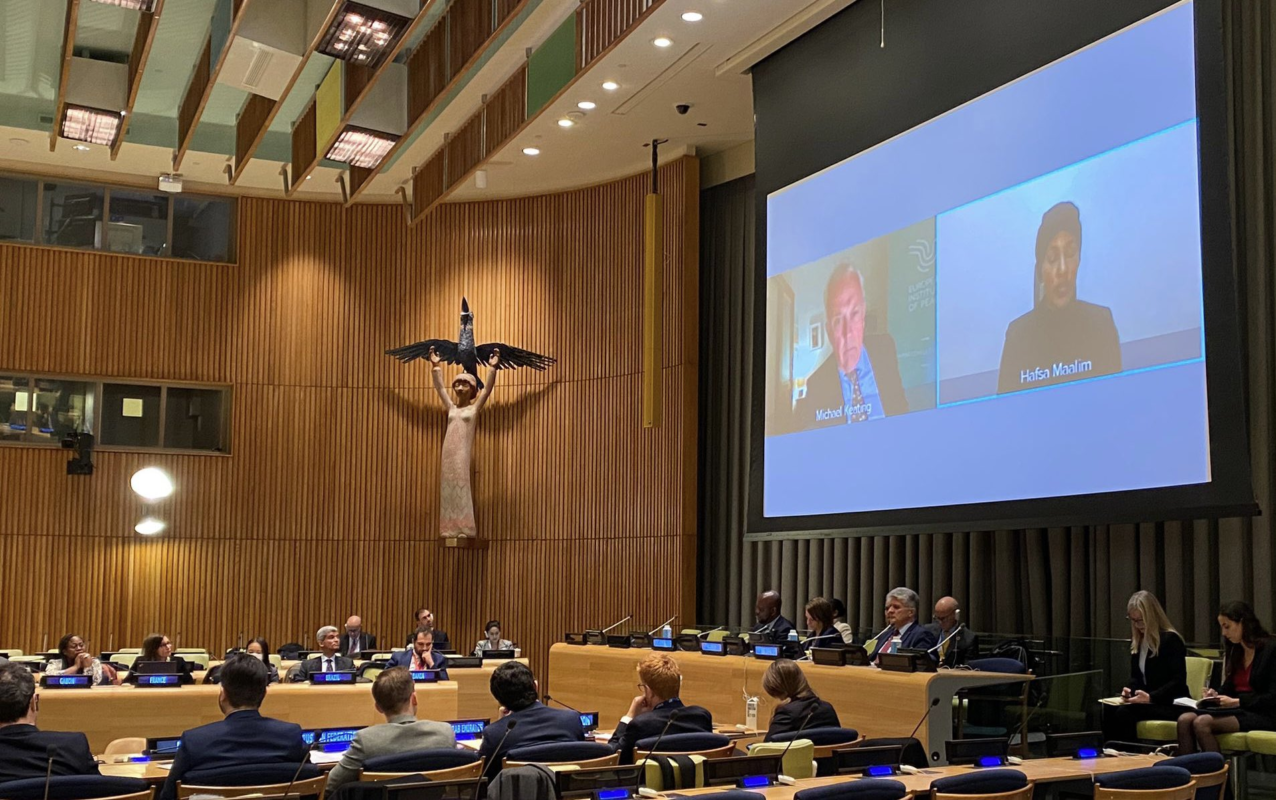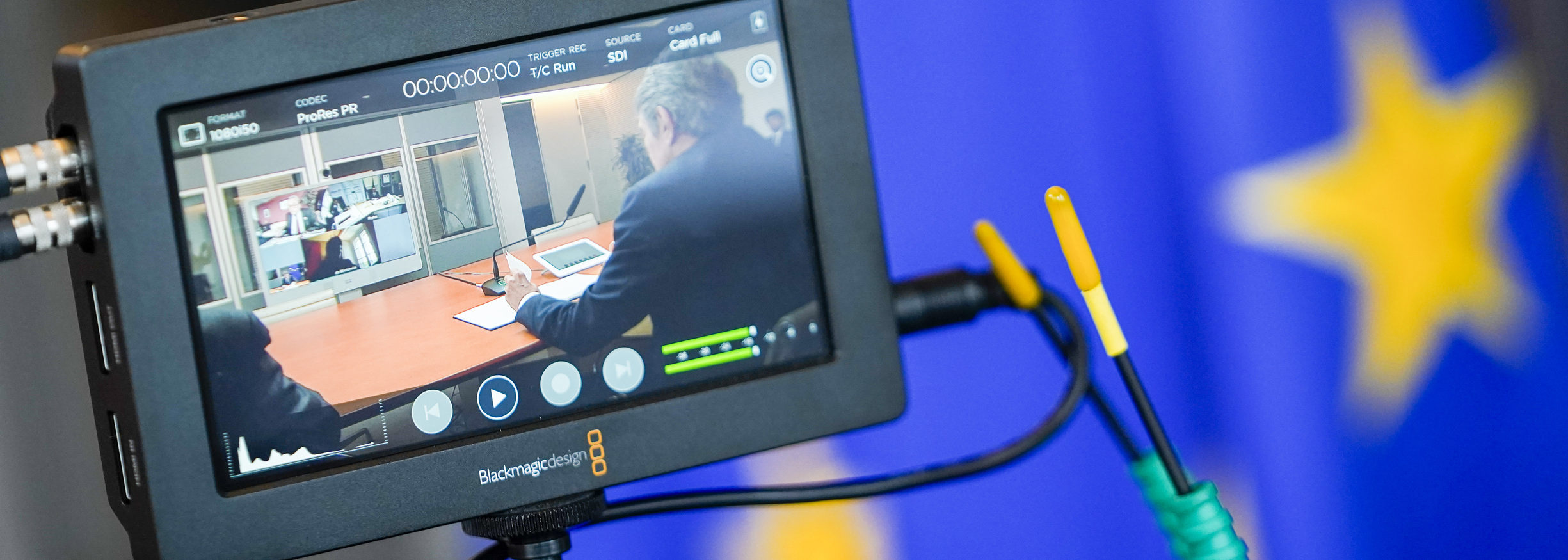UN SECURITY COUNCIL REMARKS: ‘ENVIRONMENTAL PEACEMAKING REQUIRES US TO TAKE RESPONSIBLE RISKS’
13/12/2022
29 November 2022, New York – Statement on behalf of the European Institute of Peace (EIP) delivered by Michael Keating, Executive Director at EIP, at the UN Security Council Arria-formula Meeting on Climate, Peace, and Security: Opportunities for the UN Peace and Security Architecture.
Introductory remarks were made by Ambassador Mona Juul (Norway), Co-Chair of the UN Security Council Informal Expert Group on Climate and Security. In acknowledgment of the Institute’s growing presence and engagement on the climate-security nexus, Michael Keating was invited to elaborate on whether and how climate change provides opportunities for conflict resolution.
Speech by Michael Keating during UNSC Council Arria-formula Meeting
“Thank you for this invitation. Congratulations to all those who have been involved in bringing the meeting together. It is encouraging that you are focusing not just on all the terrible negatives, but on ways in which climate change and environmental degradation can be used to advance the peacebuilding, peacemaking, and conflict resolution agenda. Such a meeting might not have been possible a few years ago.
No matter how unwelcome climate change and environmental degradation are – and of course they are different but related – they do create both the need and the opportunity to expand the conflict prevention and resolution agenda.
Here, we should not make the perfect the enemy of the possible. Yes, we must strengthen early-warning systems, deepen our understanding of the science, build a stronger evidence base regarding climate change’s impact as a threat multiplier. But time is not on our side, and some responsible risks, including fiduciary, will be needed if we are going to rise to the many challenges ahead.
One of them is bringing expertise, both at the very local and at the international level, from two worlds together. One world is those with scientific knowledge of climate and environment; the other is those with knowledge of peacebuilding, conflict prevention, dialogue and mediation.
The difficulties of doing this is evident in so many countries, despite the centrality of climate change and environmental degradation to peace and security. It certainly was in Somalia when I served as SRSG, which is why I teamed up with UNEP to propose the Climate and Security Advisor post, a first. It is a measure of how strong the headwinds were that it took several years to get the post funded and filled. It is encouraging that other peacekeeping and political missions are appointing Advisors.

The basic idea should be to ensure that knowledge of climate change and environment enrich and inform national strategies for peace and security, peacebuilding very broadly painted, and specifically conflict resolution, and that these are used to identify entry-points and create momentum for reconciliation, dialogue, and mediated agreements.
The UN is uniquely credentialled to support this, given the political sensitivities. It needs to continue regearing its own approach. It is very encouraging to hear the Assistant Secretary-General talking about what is going on in this regard – a big uptake from a few years ago. There are many practical ways in which this can happen; let me just mention a few:
- by ensuring that climate and environment are central to mission planning, risk management, and conflict resolution.
- by working with local authorities to look at core political issues, for example the national security architecture, or sharing of revenues between central and local authorities – from climate and environmental perspectives. This does not happen enough.
- by looking at the environmental, energy, and waste footprint of UN missions, particularly peacekeeping. Often, they are the biggest procurers of goods and services in the country; they should role-model climate and environmentally sensitive approaches.
- by partnering to bring actors together, including the private sector, civil society, local NGOs, international NGOs, governments, international actors to create a climate and security community of practice at the national level – and even locally or internationally.
- by advocating for the use of adaptation funds for peacemaking and peacebuilding.
Realizing this agenda and optimizing the UN’s role remains difficult for several reasons. Some are operational, complicated by the compartmentalization of the UN and competition for funding.
The availability of funding is critical. It is encouraging that COP 27 in Sharm-el-Sheikh resulted in the creation of a Loss and Damage fund, but there is a long way to go; we need to be realistic about resources available to least developed countries and in particular fragile and conflict affected states.
Our research indicates that total annual global flows of climate-related finance in and between countries, defined in the broadest sense, averaged a little over US$600B in 2019/2020. Of this, only 10% of global went towards adaptation, and very little of that went towards the least developed countries. Amongst the least developed countries, some face a triple vulnerability – the threat or reality of armed conflict, chronic poverty, and severe climate impact.
Thus, it is observed that climate funding per capita to fragile states varies between US$2 and $10, compared to $161 in non-fragile developing countries. Using adaptation funds more creatively is essential but to go to scale, the flow of adaptation funding to least developed countries including fragile states must increase.
My organization is working with many others including the UN on how climate change and environmental degradation can be used to strengthen dialogue, conflict resolution, and mediation. Examples include
- by listening to the people who are most directly affected and hearing their stories and proposals. An inclusive approach is fundamental.
- by undertaking comprehensive conflict analysis – power structures, the political economy, illicit trade – from an environmental and climate perspectives.
- by engaging power brokers, governmental and private sector, at local, national, and international levels on these issues. This is not always easy – for example access non-state armed groups.
- by exploring how these issues lend themselves to new forms of dialogue, or can enrich existing negotiations.
- by recording, monitoring, evaluating and sharing knowledge that is gained.
There are many opportunities and entry-points. Our understanding of these opportunities and entry-points is increasing, but not at the same pace as the problem that we are facing.
As the Secretary-General said: “We are in the fight of our lives, and we are losing”. The disconnect between the scale of the crisis we are facing, and the political will and the financial resources available is very evident. I very much hope that this meeting will result in the Council banging the drum for increased finance and political support for conflict resolution, peacemaking, and peacebuilding in this space.”
Our understanding of these opportunities and entry-points is increasing, but not at the same pace as the problem that we are facing
Reactions by Michael Keating to remarks made during the meeting
“Thank you very much, Chair.
It goes without saying that reduction of emissions, increasing funding for adaptation and using that for conflict prevention and conflict resolution, and making the Loss and Damage Fund work and meaningful are critical pieces in the architecture going forward.
I worry that we are not as aware as we need to be of just how colossal the challenge before us is, in terms of the impending collapse of natural systems upon which our economies and way of life depend. We are now entering terra incognita.
Climate change is resulting in unpredictable developments. Quite rightly, there has been an emphasis on understanding the connections between climate and environment on the one hand, conflict prevention and resolution on the other.
But as we are in terra incognita, I would conclude by saying that we need a stronger typology of these connections. Many of them have been mentioned today. Some of them are best addressed from a development perspective. Some are best addressed from security and conflict resolution one.
Knowing the system and as a great supporter of the UN, I believe that the appointment of a Special Envoy will give a degree of focus and momentum. Given the scale of the problem, I do not see there necessarily being a lack of complementarity between engaging the Security Council, the Peacebuilding Commission, the UNFCCC, the General Assembly. Which is best suited depends on which aspects of this extraordinary problem we are dealing with; the traffic needs to be directed to the right place.
At a time when the existence of many communities and even states is in question, I do not think the security dimensions of this problem can be underestimated, nor do I think that we should shy away from using an understanding of climate and environment to increase our understanding of conflict resolution, dialogue, and mediation.
Thank you very much, Madam Chair, Mister Chair, for this opportunity, and thank you very much for an extraordinarily rich and interesting conversation”.
I worry that we are not as aware as we need to be of just how colossal the challenge before us is
Video available here.

